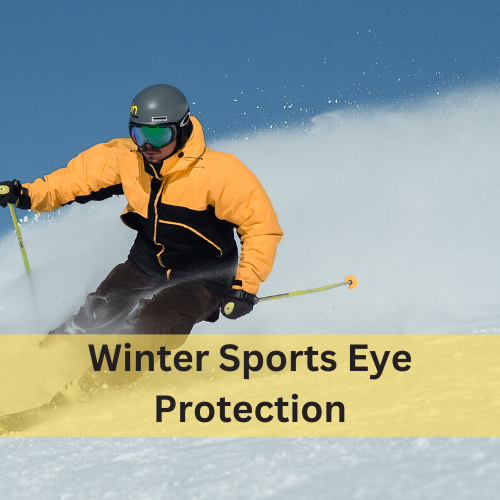Best Winter Sports Eye Protection


Protecting your eyes during winter sports, such as sledding, snowboarding, and skiing, is crucial to ensure clear vision, prevent injuries, and shield your eyes from harsh environmental conditions. Here are some tips for eye protection during winter sports:
Wear Protective Eyewear: Invest in high-quality, sport-specific goggles or sunglasses designed for winter sports. Look for eyewear that provides 100% UVA and UVB protection to shield your eyes from harmful ultraviolet rays.
Choose Goggles with Anti-Fog Coating: Select goggles with anti-fog coatings to prevent fogging caused by temperature changes. Fogged goggles can impair vision and increase the risk of accidents.
Bring Spare Lenses: Some goggles come with interchangeable lenses suitable for different light conditions. Consider bringing spare lenses to adjust to changing weather and lighting.
Wear Polarized Lenses: Polarized lenses can reduce glare from the sun reflecting off snow, ice, and other surfaces. This improves visibility, especially in bright, snowy conditions. Snow can reflect a significant amount of UV radiation. In winter, when the ground is covered with snow, the reflection of UV rays from the snow can contribute to increased UV exposure. This is sometimes referred to as “snow blindness.”
Ensure a Secure Fit: Choose goggles or sunglasses with a secure and comfortable fit to prevent them from shifting during activities. A snug fit helps protect your eyes from wind, snow, and debris.
Use Helmets with Integrated Shields: If you’re engaging in activities like snowboarding, wear helmets with integrated shields or goggles. This provides additional protection for your eyes and head.
Protect Against Wind and Cold: Ensure that your eyewear provides a barrier against cold winds and blowing snow. Windproof goggles with a foam lining can help protect your eyes from the elements.
Keep Your Eyewear Clean: Regularly clean your goggles or sunglasses to maintain clear vision. Use a lens cleaning solution and a microfiber cloth to remove snow, moisture, and smudges.
Stay Hydrated: Drink plenty of fluids to stay hydrated, as dehydration can contribute to dry eyes. Dry eyes can be exacerbated by cold winds and exposure to snowy environments.
Take Breaks: If engaging in prolonged activities, take breaks to rest your eyes and prevent eye strain. This is particularly important if you’re engaged in activities that involve intense focus or concentration.
Be Mindful of Altitude: If you are at high altitudes, the intensity of UV radiation increases. Ensure that your eyewear provides adequate UV protection, as exposure to UV rays can be more significant at higher elevations.
By following these tips and wearing appropriate eyewear, you can enjoy winter sports safely while protecting your eyes from potential hazards and environmental conditions.
Gregory Scimeca, M.D.
Ophthalmologist and Medical Director
The Eye Professionals
Our Locations
